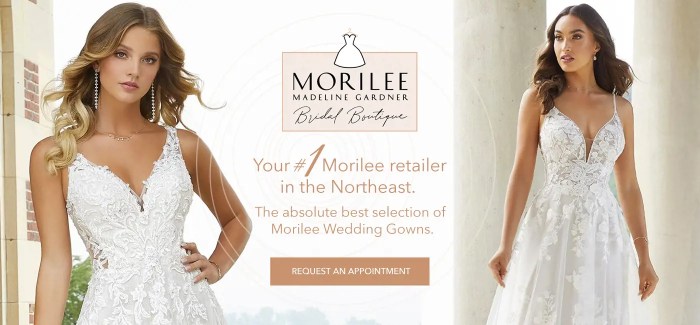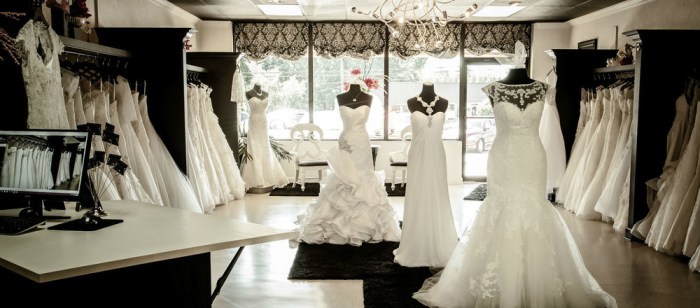Understanding the Resale Wedding Dress Market: Boutiques That Buy Wedding Dresses
Boutiques that buy wedding dresses – The market for pre-owned wedding dresses has experienced significant growth in recent years, driven by both economic factors and a growing awareness of sustainability. This burgeoning industry offers brides a cost-effective alternative to purchasing new gowns, while simultaneously providing a platform for selling previously worn dresses. This section will explore the key aspects of this market, including the various types of boutiques involved and their respective pricing and condition requirements.
Current Trends in the Resale Wedding Dress Market

Source: timeout.com
Several key trends define the current resale wedding dress market. Increased online presence through dedicated websites and marketplaces is prominent. Sustainability concerns are driving demand for pre-owned options, aligning with environmentally conscious consumer choices. A wider variety of styles and designers are becoming available, catering to diverse tastes and budgets. Finally, the rise of social media platforms like Instagram and Pinterest facilitates both the discovery of resale options and the showcasing of dresses for sale.
Types of Boutiques That Buy Wedding Dresses
Several types of businesses participate in the resale wedding dress market, each with its own approach to purchasing and selling gowns. These include consignment shops, which take a commission on successful sales; online marketplaces, offering a broad reach to potential buyers; and specialized bridal resale stores, often offering additional services like cleaning and alterations.
Pricing Strategies of Wedding Dress Boutiques
Pricing strategies vary considerably. Consignment shops typically take a percentage (e.g., 30-50%) of the final sale price. Online marketplaces may charge listing fees or transaction fees. Specialized bridal resale stores often have a more structured pricing model, factoring in the dress’s condition, designer, and style. They may also offer price negotiations based on market demand and the duration the dress remains unsold.
Condition Requirements for Accepted Dresses
Boutiques typically have specific requirements for the condition of accepted dresses. These usually include criteria regarding cleanliness (minimal stains or damage), structural integrity (no significant tears or rips), and overall wear and tear (minimal alterations, if any). Many boutiques will specify the acceptable level of alterations and will only accept dresses within a certain age range (e.g., dresses worn within the last few years).
Some may also require professional cleaning before acceptance.
The Selling Process for Brides
Selling a wedding dress can be a rewarding experience, both financially and environmentally. Understanding the process, preparing necessary documentation, and employing effective selling strategies are crucial for maximizing the return. This section details the steps involved and offers valuable tips to navigate the process successfully.
Steps Involved in Selling a Wedding Dress
- Research potential buyers (boutiques, online marketplaces).
- Clean and prepare the dress (professional cleaning is often recommended).
- Gather necessary information (purchase date, designer, condition).
- Contact potential buyers and inquire about their requirements and process.
- Negotiate pricing and terms of sale.
- Complete the transaction and receive payment.
Checklist for Brides Selling Wedding Dresses
- Original purchase receipt or invoice
- High-quality photographs of the dress (from multiple angles)
- Detailed description of the dress (designer, size, condition)
- Information on any alterations or repairs
- Copy of your identification
Tips for Maximizing the Selling Price
To maximize your return, consider these factors: Properly cleaning and preserving your dress is essential. High-quality photos are crucial for attracting potential buyers. Accurate and detailed descriptions increase buyer confidence. Negotiating with multiple buyers allows for better pricing. Being flexible with your price, while still maintaining a fair value, can be beneficial.
Knowing the market value of similar dresses helps set realistic expectations.
Common Challenges Brides Face When Selling Dresses
Challenges include finding reputable buyers, accurately assessing the dress’s value, negotiating the price, and dealing with potential delays in the selling process. Emotional attachment to the dress can also impact the selling process. Lack of awareness about the resale market and appropriate pricing strategies can lead to lower-than-expected returns. Additionally, navigating the logistics of shipping or transporting the dress can be cumbersome.
Boutique Operations and Practices
Successful bridal resale boutiques employ efficient inventory management, meticulous cleaning processes, and effective marketing strategies. Understanding their operations and practices is crucial for both sellers and buyers.
Inventory Management Practices
Boutiques utilize various inventory management systems, ranging from simple spreadsheets to sophisticated software solutions. These systems track incoming dresses, their condition, pricing, and sales status. Efficient organization and categorization of dresses by size, designer, and style are crucial for quick retrieval and customer service.
Cleaning and Restoration Processes
Professional cleaning and restoration are vital for maintaining the quality of the dresses. Specialized cleaning techniques are employed to remove stains and dirt without damaging delicate fabrics. Minor repairs, such as replacing buttons or stitching seams, are often performed to enhance the dress’s appeal. The use of appropriate preservation techniques ensures the longevity of the gown.
Marketing and Advertising Strategies, Boutiques that buy wedding dresses
Boutiques employ a mix of online and offline marketing strategies. Online presence through websites and social media platforms is crucial. Search engine optimization () ensures visibility to potential customers. Paid advertising on platforms like Google Ads and social media can expand reach. Collaboration with wedding planners and photographers provides additional exposure.
Participation in bridal shows and events can also drive sales.
Business Models of Bridal Resale Boutiques
Brick-and-mortar stores offer a tangible experience but incur higher overhead costs. Online-only boutiques enjoy lower overhead but may lack the personal touch of in-person shopping. Hybrid models, combining online and offline presence, aim to leverage the advantages of both approaches. Each model requires a distinct marketing and operational strategy to succeed.
Legal and Ethical Considerations
The sale and purchase of used wedding dresses involve legal and ethical considerations for both boutiques and brides. Transparency, fair pricing, and clear contractual agreements are paramount to ensure a positive experience for all parties involved.
Potential Legal Issues
Legal issues may arise from disputes over the dress’s condition, pricing, or contractual obligations. Clear communication and detailed contracts are essential to mitigate potential problems. State laws regarding consumer protection and sales transactions may also apply.
Ethical Considerations
Ethical considerations include honest representation of the dress’s condition, fair pricing practices, and transparent communication with customers. Boutiques should maintain professional conduct and handle customer concerns with empathy and respect. Brides should accurately represent their dress’s condition and provide all relevant information.
Importance of Fair Pricing and Transparent Practices
Fair pricing ensures both the seller and the buyer feel satisfied with the transaction. Transparency in pricing, fees, and the condition of the dress builds trust and fosters positive relationships. Clear communication minimizes misunderstandings and potential disputes.
Sample Contract for Wedding Dress Sale
A well-structured contract protects both the bride and the boutique. It should clearly Artikel details of the dress, seller information, boutique information, and financial aspects.
| Dress Details | Seller Information | Boutique Information | Financial Details |
|---|---|---|---|
| Designer: [Designer Name] Style: [Style Description] Size: [Size] Condition: [Condition Description] |
Name: [Seller Name] Address: [Seller Address] Phone: [Seller Phone] Email: [Seller Email] |
Name: [Boutique Name] Address: [Boutique Address] Phone: [Boutique Phone] Email: [Boutique Email] |
Selling Price: [Price] Commission (if applicable): [Commission Percentage or Amount] Payment Method: [Payment Method] Payment Date: [Payment Date] |
Customer Experience and Reviews

Source: jbbridals.com
Positive customer experiences are essential for the success of bridal resale boutiques. Gathering feedback through surveys and actively addressing concerns are crucial for building a strong reputation and fostering loyalty.
Customer Satisfaction Survey for Brides

Source: thequick-witted.com
A customer satisfaction survey should assess aspects such as ease of the selling process, communication with the boutique, fairness of pricing, and overall satisfaction. Questions should be clear, concise, and easy to answer. The survey can be administered via email or online platforms.
Examples of Positive and Negative Customer Reviews
Positive reviews highlight aspects like efficient communication, fair pricing, and a smooth transaction. Negative reviews often cite issues such as poor communication, inaccurate dress descriptions, or difficulties in receiving payment. These reviews offer valuable insights for improvement.
Strategies for Improving Customer Experience
Strategies include providing clear and consistent communication, ensuring accurate dress descriptions, establishing a transparent pricing structure, and promptly addressing any concerns or issues. Offering personalized service and building rapport with clients enhances the overall experience.
Effective Communication Methods
Effective communication methods include prompt email responses, regular updates on the selling process, and clear explanations of fees and procedures. Using multiple channels (e.g., email, phone, text) allows for flexibility and convenience.
Visual Representation of the Selling Process
The process of selling a wedding dress to a boutique involves several key steps, each contributing to a successful outcome. A clear understanding of these steps can streamline the process and ensure a positive experience.
Process of Selling a Wedding Dress
- Initial Contact: Contacting the boutique to inquire about their buying process and requirements.
- Dress Appraisal: Submitting photos and details of the dress for evaluation.
- Negotiation: Discussing and agreeing upon a selling price.
- Preparation: Cleaning and preparing the dress for sale.
- Delivery/Shipping: Transporting the dress to the boutique.
- Inspection and Confirmation: The boutique inspects the dress and confirms its condition.
- Payment: Receiving payment from the boutique.
Visual Elements of a High-Quality Boutique
A high-quality boutique should have a welcoming and elegant atmosphere. Dresses should be displayed attractively, showcasing their details and craftsmanship. The boutique’s overall presentation should be professional and inviting, reflecting the quality and value of the gowns it offers. Consider soft lighting, tasteful décor, and a well-organized layout. The use of mirrors to showcase the dresses and comfortable seating for customers are essential elements.
A clean and well-maintained space reflects professionalism and respect for the garments.
FAQ Explained
What documents do I need to sell my wedding dress?
Many boutiques offer the convenient service of buying pre-owned wedding dresses, providing a sustainable and budget-friendly option for brides. If you’re considering a shorter gown, you might find inspiration browsing selections of best tea length wedding dresses before deciding which style to seek out at a buying boutique. These boutiques often have a diverse range of styles and sizes, making it easier to find your perfect dress, regardless of length or style.
Typically, you’ll need the original receipt or purchase confirmation, and potentially a cleaning certificate if the dress has been professionally cleaned.
How long does the selling process usually take?
This varies widely depending on the boutique and demand, but it can range from a few weeks to several months.
What if my dress is damaged?
Most boutiques will assess the condition of the dress and may offer a lower price or refuse the dress if the damage is extensive.
Can I get my dress back if it doesn’t sell?
This depends on the boutique’s policy. Some boutiques will return the dress after a set period, while others may not.